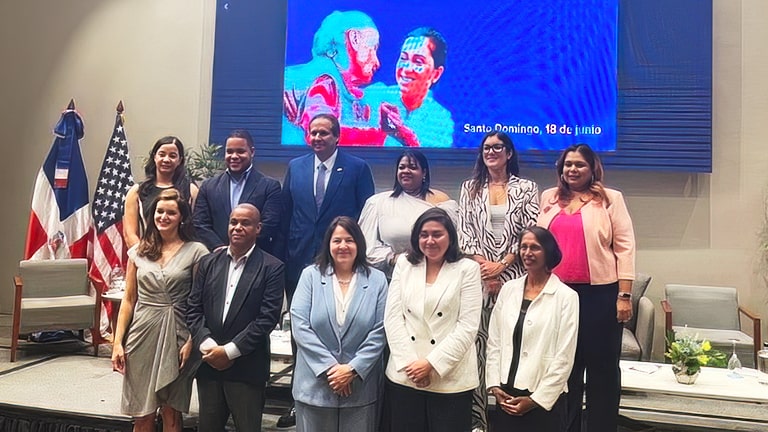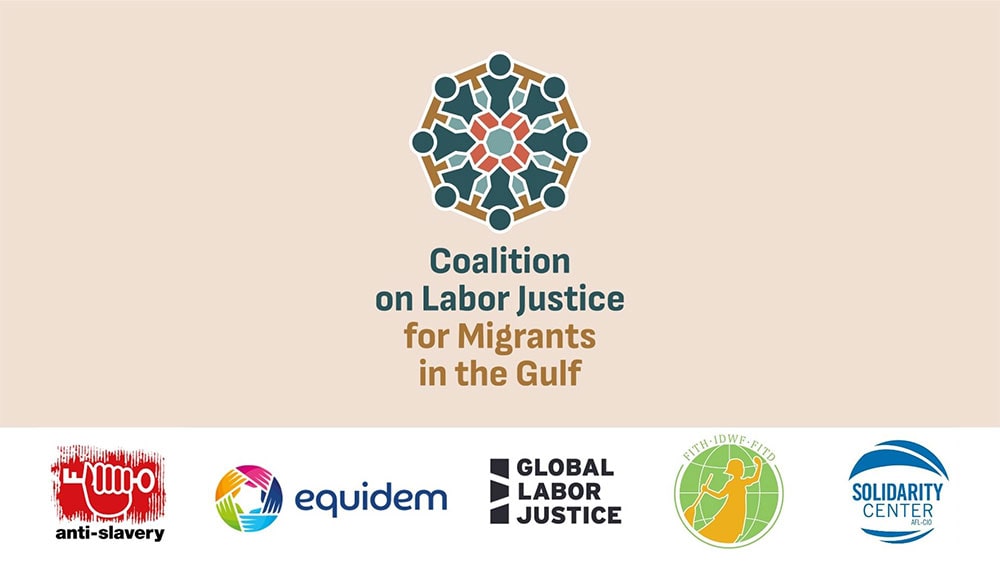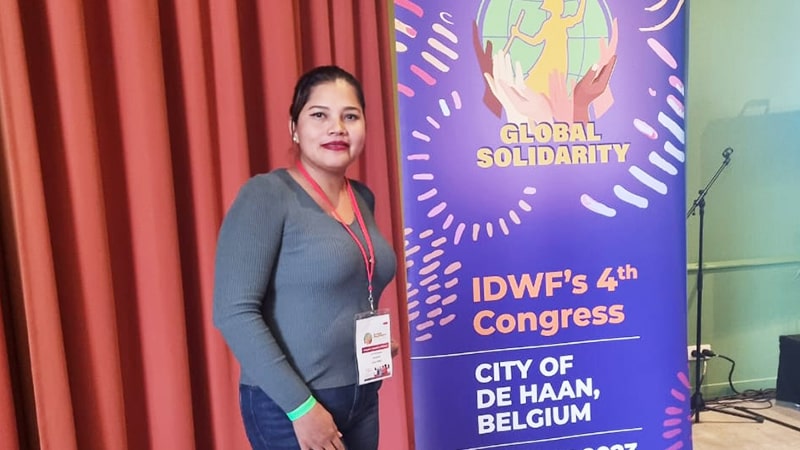Creuza Oliveira, a historic leader of the Brazilian and Latin American domestic workers’ movement, has been awarded the title of Doctor Honoris Causa by the Federal University of Bahia (UFBA), Brazil, becoming the first union leader of her kind to receive this honor. After a lifetime dedicated to advocating for the rights of domestic workers, Creuza shows the world that domestic workers are not only subjects of academic study but also producers of knowledge. This distinction marks a before and after for our movement: domestic workers have entered the university to be active protagonists in the narration of their own history!
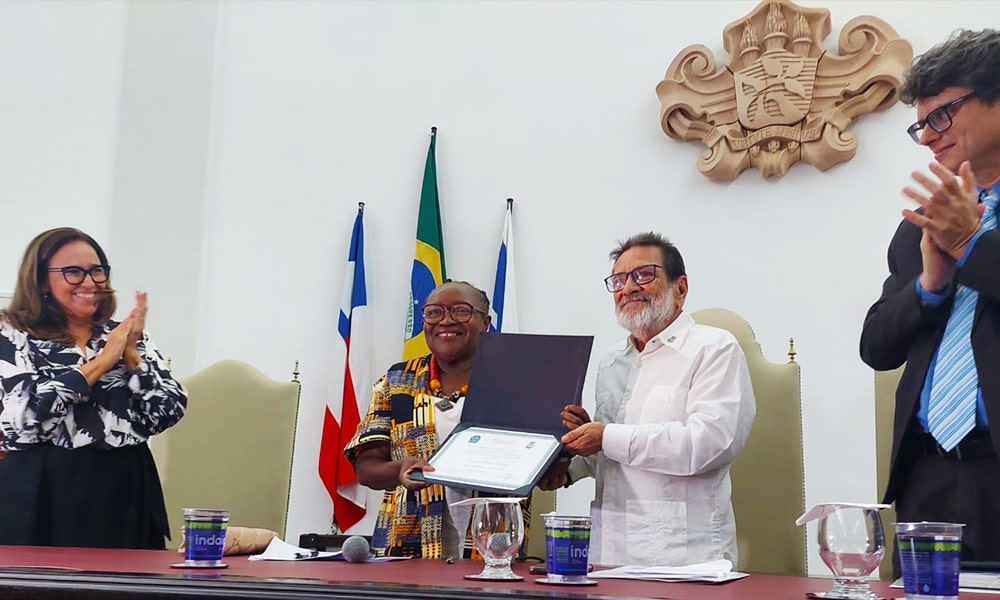
Could that 10-year-old Bahian domestic worker girl have imagined that today, five decades later, more than 200 people would applaud her in the Noble Hall of the Federal University of Bahia? Could that little girl under modern slavery conditions, have even dreamed that she would make history and become a Doctor?
On November 24th, the Honorary President of the National Domestic Workers Federation (FENATRAD), Secretary of Training and Union Studies of the Domestic Workers Union of Bahia (SINDOMÉSTICO/BA), and General Coordinator of Instituto 27 de Abril (IEC), received the highest recognition for her long trajectory of struggle and achievements: the title of Doctor Honoris Causa from the UFBA. In a room filled with domestic workers, activists from various social movements, congresspeople, politicians, and students, Creuza received the distinction with her usual humility, making her fellow fighters part of the moment: “I am here with comrades who are part of my personal and struggle history. It’s not Creuza who wins today; it’s all of us,” she said.
For Creuza Oliveira, “the academic sphere has always been distant from the working people and the less privileged classes. It was only with the “Quota Law” (2012) that the children of domestic workers, indigenous people, and black populations were able to access the university. This title will open doors for more people. It is a very important victory for our struggle and our history.”
The ceremony was attended by domestic workers’ leaders from all over Brazil, including Nair Jane de Castro Lima, a prominent figure and Director of the Domestic Workers Union of Baixada Fluminense, who, at 92 years old, traveled from Rio de Janeiro to witness this historic moment. Luiza Batista, FENATRAD’s General Coordinator, was also present and stated: “It is immense joy to know that the university is recognizing the social value of domestic work. Our dear Creuza Oliveira is a black star that has been illuminating our history of struggle, achievements, and demands. We have the first black domestic worker graduated as Doctor Honoris Causa. Habemus Creuza!”
The International Domestic Workers Federation (IDWF) accompanied Creuza through Ana Paula Melli, Program Officer for Latin America. “By granting this title to Creuza, the university acknowledges that the knowledge of the working class, resulting from concrete experiences, is essential to overcome the exclusionary mark of Brazilian society. This title is a demonstration that the university is also for the poor, black, and peripheral population. Moreover, it is the result of the collective struggle of countless determined women who have dedicated and continue to dedicate their lives to achieve better living and working conditions for domestic workers, seeking to be recognized and valued as workers, with all the pride they have in their profession,” emphasized Melli.
The words of Professor Elisabete Pinto, representative of the UFBA’s Institute of Psychology and driving force behind the initiative, make it clear why this honorary degree marks a milestone for the domestic workers’ movement: “Creuza Oliveira is an organic intellectual who managed to organize black women from all over Brazil around labor issues. Few Doctors succeed in having the knowledge they generate at the university make a social impact and transform lives. Creuza is a Doctor because she has been able to conquer the human rights of domestic workers, and the UFBA understands the importance of her struggle.”
On her part, Deputy Olívia Santana stressed: “Creuza is a practical reference in building knowledge about domestic workers, denouncing the super exploitation of this workforce, breaking the limits of the ‘servant quarters’ at colonial farm properties, projecting her voice towards the organization and struggle of black women, the defense of domestic workers, and the conquest of labor rights.”
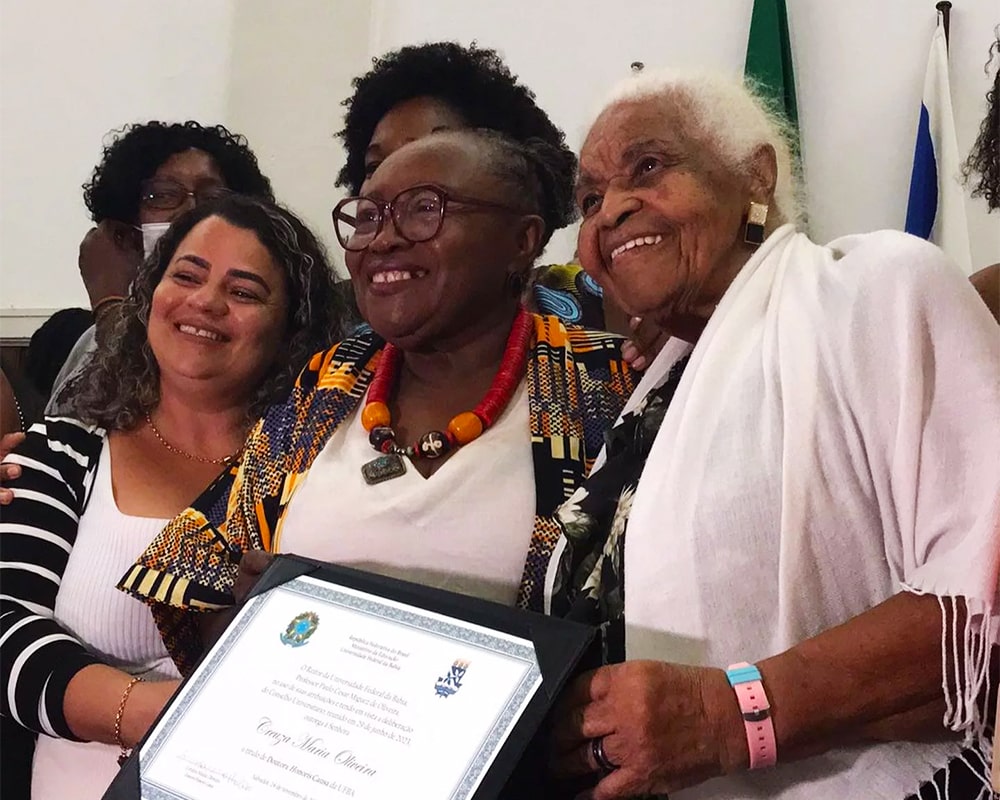
A life of struggle, activism, and social commitment
Creuza Oliveira was born in 1957 in Santo Amaro, Bahia, into a very poor family of rural workers. At the age of 10, she started working as a domestic worker to contribute to the family’s economy. At 12, without a home due to the death of her parents, she was forced to work live-in. For nine years, she served her employers without any remuneration: just in exchange for clothing, food, and accommodation.
With great effort, Creuza was able to start school at the age of 16 and managed to finish high school at 30, studying at night. Only when she turned 21 did she start receiving a salary, although so low that it did not allow her to subsist or maintain her own home, so she continued to depend entirely on her employers, who mistreated her, beat her, and even sexually abused her, derogatorily calling her a “lazy black woman.” She had to wait ten more years to receive her first minimum wage, after the government recognized it as a right in 1988.
In the 80s, upon learning that a group of domestic workers met periodically at a school in the city of Salvador, she did not hesitate to join them. Gradually, her charisma, ability, and commitment led her to lead the incipient movement of Bahian domestic workers, mostly composed of black and poor women, who became her priority and family. Creuza gave up forming a family to dedicate herself to advocating for the most unprotected workforce in Brazil.
In 1986, Creuza founded the Domestic Employees Association of Bahia. At that time, domestic workers were not yet recognized as workers and, therefore, did not have the right to form a union. Only in 1988, with the promulgation of the Federal Constitution, could the category unionize. Four years later, she co-founded the Domestic Workers Union of Bahia, which she presided over for eleven years while continuing working as a domestic worker. In addition, Creuza was one of the founders of the “27 de abril” social housing complex, in Salvador, created specifically for domestic workers.
Creuza’s outstanding work at the union of Bahia led her to the presidency of the National Domestic Workers Federation (FENATRAD) for 14 years. In June 2011, she was part of the official Brazilian delegation to the ILO General Conference in Geneva and actively participated in the elaboration of Convention 189. In 2013, she contributed to Constitutional Reform 72, known as the “Domestic Workers’ PEC,” which granted previously unrecognized rights to domestic workers: minimum wage set by law, bonus (13th salary), weekly rest, paid vacation, maternity leave, retirement benefits, and access to social security, among others.
Creuza Oliveira’s life has been dedicated to defending the rights of domestic workers, black people, women and children. According to her, “the struggle of domestic workers in Brazil is related to issues of race, gender, and class. Our category has always been unrecognized, undervalued, and mistreated because it is made up of black women. Society does not see our work as a work, even though we are the country with the highest number of domestic workers in the world. We contribute to economic development and play a fundamental role in the independence of white middle-class women because we take care of their children and homes so that they can study and participate in the labor market.”
The passage of time has not quieted this “lioness,” who continues to be active in FENATRAD, the Unified Black Movement, and the Women’s Movement. She also contributes to the Creuza Oliveira Collective, a group of Bahian women created in her honor, frequently participates in international events, and is consulted by media and organizations worldwide as a reference in the domestic workers’ movement.
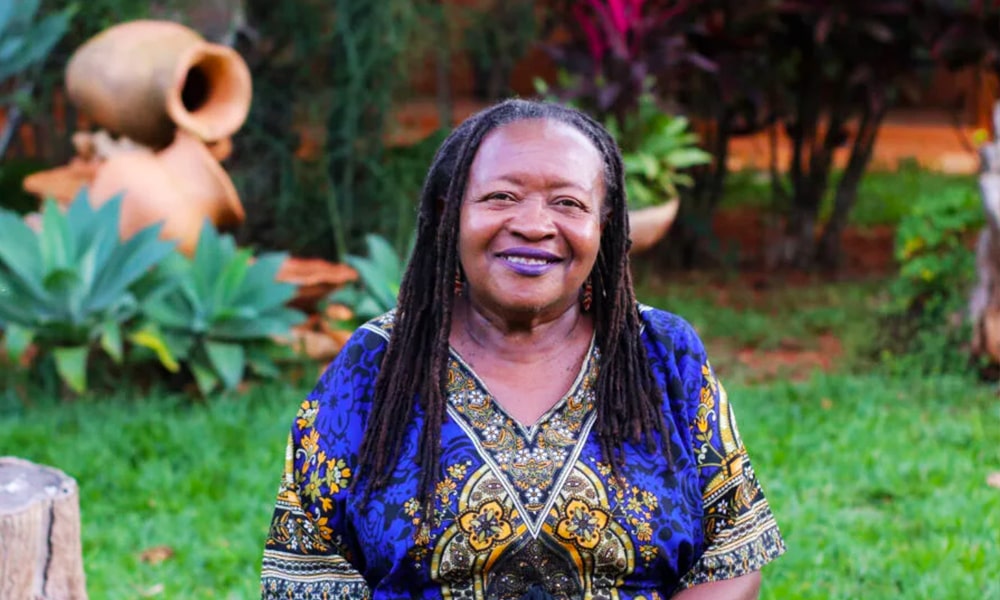
You reap what you sow
The title of Doctor Honoris Causa crowns the long list of distinctions that Creuza Oliveira has received during her union journey:
- Human Rights Award from the Brazilian Federal Human Rights Department, for her fight against child labor (2003) and for her fight for racial equality (2011).
- Claudia Magazine Award, “Women Who Make a Difference,” in the Social Work category (2003).
- “Dame of the Order of Labor Merit” Award, given by President Luiz Inácio Lula da Silva (2005).
- Nomination for the 1,000 Women for the Nobel Peace Prize (2005).
- “Raça Negra” Award from the Zumbi dos Palmares University, São Paulo (2013).
- “Warrior Women” tribute from the Social Security Body (2013).
- “Bertha Lutz Citizen Woman” certificate from the Federal Senate (2015).
- “Commander of the Order of July – Bahia Liberators” Award (2023).
Creuza also received several proposals to take up public office at the regional and national levels: in 2008 and 2012, she was elected councilor of the city of Salvador for the Workers’ Party (PT); and in 2014, she ran for national deputy for the Brazilian Socialist Party but was not elected, according to her, “for being a woman, a black person, and a domestic worker.”
This amazing black woman and domestic worker is now nothing less than Doctor Honoris Causa at a university. A source of pride and inspiration for our global movement, Creuza Oliveira embodies the “yes, we can” like no other and renews our confidence in a near future where decent work and dignified life will be a reality for 80 million women worldwide.
Download


